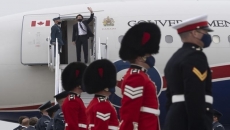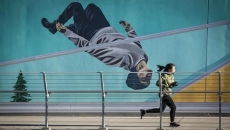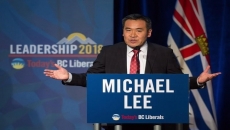CARBIS BAY, CORNWALL, ENGLAND - Canada's prime minister spent Friday meeting along the English coast with his democratic peers to discuss finding a way out of the COVID-19 pandemic, with Justin Trudeau being the only one who hasn't said how many vaccines his country will contribute to make that happen.
British Prime Minister Boris Johnson is hosting the G7 leaders for a three-day summit, taking place in the southwest village of Carbis Bay — bustling with police and summit officials — where the focus is on ending the health crisis, now in its second year.
Pleased to welcome the leaders of the @G7 for this year’s Summit in Carbis Bay, Cornwall.#G7UK #G7Cornwall #BuildBackBetter pic.twitter.com/3g5GDuhmqh
— Boris Johnson (@BorisJohnson) June 11, 2021
The United Kingdom expects leaders to agree to give other parts of the world access to one billion doses of COVID-19 vaccines through donations and funding in hopes that it speeds up the timeline to defeat the virus.
My message to the @G7:
— Boris Johnson (@BorisJohnson) June 11, 2021
As we recover from the pandemic, we need to make sure we level up across our societies.
We need to #BuildBackBetter pic.twitter.com/Ub3eSVNKBT
A Canadian government official, speaking on the condition of anonymity, says Canada will pledge up to 100 million doses, including what it bought for others in vaccine sharing initiatives.
The day before the summit, the U.K. promised to send at least 100 million doses within the next year, and U.S. President Joe Biden pledged he would send away another half a billion.
France and Germany have promised at least 30 million doses this year. Japan has committed to 30 million doses while Italy has promised 15 million doses.
Last week, Canada announced it was doubling its direct cash donation to COVAX to buy doses for developing countries, from $220 million to $440 million.
Dr. Srinivas Murthy, a critical care pediatric specialist in Vancouver with a research focus on pandemic preparedness, said then that the focus on money is a bit of a smoke screen for not sharing actual vaccines.
“It seems like Canada is trying to put a good face on things with public pressure being increased on this subject, both internally and globally,” he said in a recent interview.
“But they're landing on … sending money rather than doses, which I think isn't going to solve the problem urgently.”
Murthy said COVAX will need more money to buy doses, but there aren’t trucks full of doses just sitting waiting for a buyer.
“Obviously, they need more money to buy more doses from the main companies, but it's vaccines, not money at this point in the pandemic that's required globally.”
Trudeau started Friday not with another G7 leader, but in a virtual audience with Queen Elizabeth.
His first leader-to-leader sit-down happened with British Prime Minister Boris Johnson, who, as host of the summit, stated he wants the three-day gathering to produce promises on ways to end the pandemic by the end of next year.
Posing for photographers and journalists, the pair stood elbow-to-elbow, with Johnson flashing a thumbs up before their meeting started.
"The leaders agreed a comprehensive Free Trade Agreement between the U.K. and Canada would unlock huge opportunities for both of our countries. They agreed to redouble their efforts to secure an FTA as soon as possible," according to a readout of their conversation from the U.K.'s High Commission in Canada.
"They discussed a number of foreign policy issues including China and Iran. The prime minister thanked Prime Minister Trudeau for Canada’s leadership on the international response following the downing of the Ukraine International Airlines plane in Tehran last year."
Trudeau also made his first public appearance alongside Biden since he was elected to the White House last fall, when all the leaders posed for a group photo along a beach.
The pair didn't say much to each other, if anything, while posing for cameras and journalists. Trudeau mostly kept to himself while the leaders made their public appearances.
They sat down together later Friday to be part of a session focused how the health and economic recovery from COVID-19 can be "for all."






